Indo-Pacific: New Geostrategic Reality
On 30th June, 2020 Gateway House in association with Konrad-Adeneur-Stiftung (KAS) co-hosted a webinar on Indo-Pacific: New Geo strategic reality.
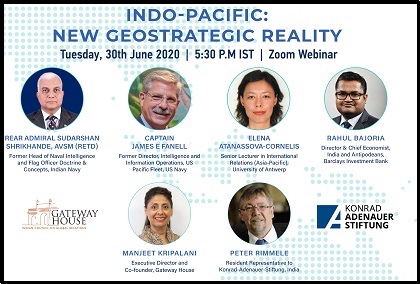 Courtesy: Gateway House
Courtesy: Gateway House
On 30th June, 2020 Gateway House in association with Konrad-Adeneur-Stiftung (KAS) co-hosted a webinar on Indo-Pacific: New Geo strategic reality.
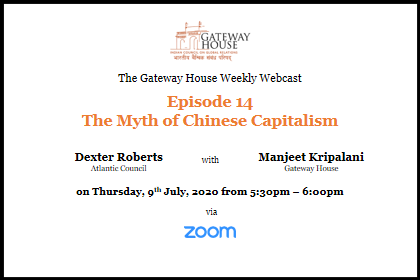 Courtesy: Gateway House
Courtesy: Gateway House
Dexter Roberts, Non-resident Senior Fellow, Asia Security Initiative, Atlantic Council & author of the newly-released book on the subject was in conversation with Manjeet Kripalani, Executive Director, Gateway House.
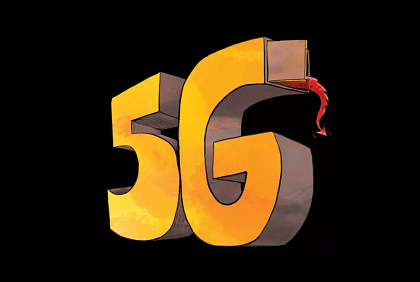 Courtesy: Uday Deb/Times of India
Courtesy: Uday Deb/Times of India
After the strategic digital pushback against Chinese investments and apps, India should turn its attention to the biggest Chinese domination tool – 5G. This is the mother lode that enables the efficient gathering of data, which when mined, results in product enhancement and pricing benefits to products listed in China 2025 and helps China set global standards. There is an urgency for alternate suppliers of 5G equipment and other technologies to avoid relying on China.
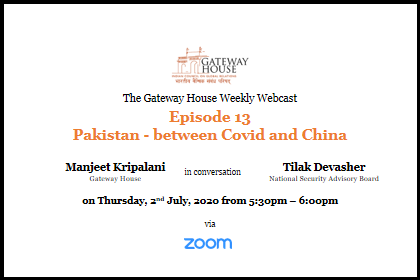 Courtesy: Gateway House
Courtesy: Gateway House
Tilak Devasher, Member, National Security Advisory Board was in conversation with Manjeet Kripalani, Executive Director, Gateway House. The discussion centered around Pakistan's management of COVID-19 and its relations with China.
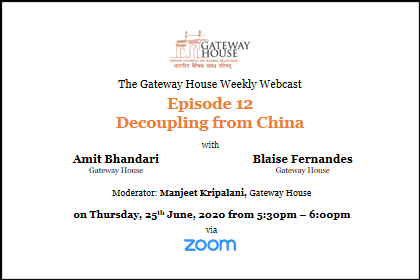 Courtesy: Gateway House
Courtesy: Gateway House
Amit Bhandari, Fellow, Energy & Environment, Gateway House was in conversation with Blaise Fernandes, Director, Gateway House. This discussion was moderated by Manjeet Kripalani, Executive Director, Gateway House.
 Courtesy: Gateway House
Courtesy: Gateway House
The sister cities of Mumbai and Shanghai have a shared history, population size, and economic significance. On 29 May, a roundtable between the Shanghai Institute of International Studies and Gateway House encouraged discussion on strategies to battle COVID-19, and kick-start city economies after a lockdown. Here are some workable solutions.
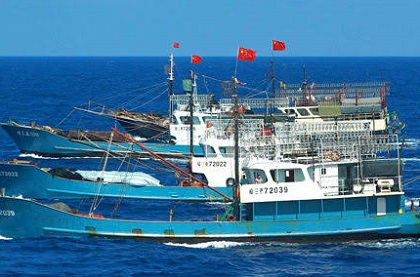 Courtesy: Tasnim News Agency
Courtesy: Tasnim News Agency
The Quad is set to launch a satellite-based maritime security initiative to monitor illegal fishing by the Chinese maritime militia. This is long overdue. China’s ‘little blue men’ are recruited from its fishing communities but are in fact official members of a well networked and controlled defense force engaged in regional grey zone warfare.
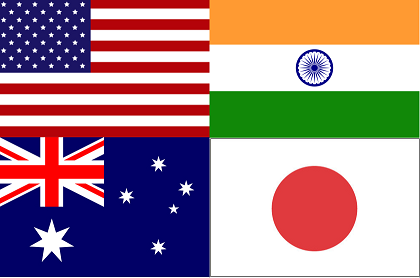 Courtesy: Shutterstock/Gateway House
Courtesy: Shutterstock/Gateway House
China’s escalating actions in the wake of the COVID-19 catastrophe is a calculated strategic diversion and risk. In the Indo-Pacific, tensions between China and the U.S., Australia, India and others are building momentum. As a geopolitical partnership, the relevance of the Quad is now proven. There are clear ways to empower it immediately, and make it a resilient grouping.
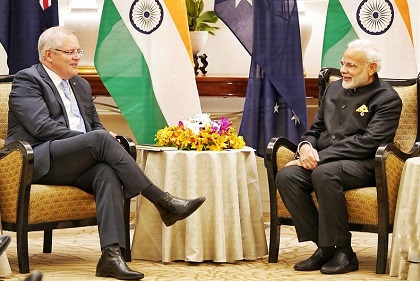 Courtesy: MEA/Flickr
Courtesy: MEA/Flickr
At the 4 June, India-Australia, virtual summit, one of the most critical, among several agreements signed, was the Mutual Logistics Support Agreement (MLSA). India has logistics support agreements with many countries. How is the MLSA with Australia any different? Given the geo-strategic maritime competition with China, this agreement is uniquely significant and could be especially beneficial for the Indian Navy.
Manjeet Kriplani, Executive Director, Gateway House, in discussion with Prof. Rory Medcalf, Head, National Security College, Australian National University, and author of Indo-Pacific Empire: China, America and the Contest for the World's Pivotal Region; and Cleo Paskal, Associate Fellow, Energy, Environment and Resources, and Asia-Pacific, Chatham House; on the possibility of an Indo-Pacific Charter for the region.